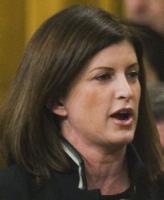The Canadian government appears to be warming to the Kyoto protocol after a week of heavy fire both at home and abroad for its refusal to meet binding targets to reduce greenhouse gas emissions between 2008 and 2012.
Environment Minister Rona Ambrose said Friday at the close of the annual United Nations climate-change conference that Canada had been “hesitant” at first, not wanting to make the commitment until it was sure it could follow through. Her government needed time to understand the agreement, before it could start establishing policies to tackle climate change in an effective way and be genuine on the international stage when saying it could work for Canada, she added. “We’ve made a lot of progress in the last nine months to make sure that we can align our domestic policy with what we’d like to do internationally, with our international obligations,” she said. “And so now we can say that.”
Ambrose’s remarks came in the wake severe criticism from delegates to the Nairobi conference – especially France and other European nations – coupled with new poll results in Canada showing 26 per cent of respondents said the key factor in their vote in the next election will be the environment. Of those, 29 per cent planned to vote Liberal in the election widely expected sometime next year for the minority Conservative government.
Although, the previous Liberal government committed Canada to reduce its greenhouse gas emissions by six per cent below 1990 levels under Kyoto, they actually ended up allowing emissions to increase by nearly 27 per cent.
Kyoto sets binding targets for nearly 40 industrialized countries to reduce greenhouse gas emissions between 2008 and 2012, rewarding those that exceed their targets, while forcing the rest to buy credits to achieve their required reductions.
Leaders agreed to a number of changes to the protocol in Nairobi, including allowing developing countries to decide on their own how to use the resources to meet their needs. There was also controversy over a decision to allow Belarus to take on targets under Kyoto that would allow them to profit from emissions trading. Environmentalists said it would add hot air to the system since Belarus saw a substantial drop in its emissions following the collapse of the Soviet Union. All countries agreed greenhouse gas emissions must eventually be chopped by more than half in order to avoid dangerous shifts in the climate.
Subscribe to our newsletter
Stay up to date with DeSmog news and alerts






